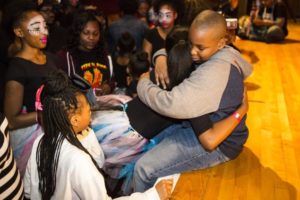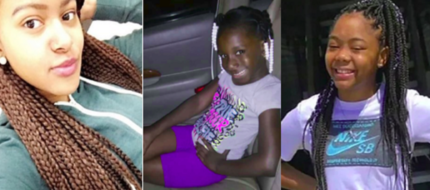
Students offer love and support for Terrell Pryor, 10, at annual citywide youth event in Crown Heights. Photo by KEVIN C. DOWNS/FOR NEW YORK DAILY NEWS
A Brooklyn youth got quite the surprise from his peers when he walked into Boys and Girls High School in Crown Heights Saturday morning.
Ten-year-old Terrell Pryor was greeted with warm hugs left and right from hundreds of students attending an annual citywide event hosted by Youth Step Up USA. Pryor, a victim of unrelenting bullying who openly contemplated suicide, was recognized as a special guest. Fellow students gathered around the elementary school student to show their love and encouragement with a parade of embraces.
Just a day before the event, Pryor’s parents, along with community leader Tony Herbert, met with the Department of Education to have their son transferred to a different school out of concern for his safety.
“We have to stand up as the Village to protect and embrace our youth,” Herbert said in a statement. “This young man had been crying out for help for some time and unfortunately it took several beatings for him to get it.”
Unfortunately, suicide rates among Black youth — specifically young Black males — has been on the rise. According to a 2015 study published in the journal “JAMA Pediatrics,” suicides among Black children have almost doubled over the last two decades, exceeding the rates of white children, which declined during the same time period. Suicides and suicide attempts are a rare occurrence in children before they hit puberty, but the results of this recent study are cause for concern. Authors of the study suggest programs for youth and talking about stressful situations, such as bullying, could potentially decrease the risk of suicide in adolescents.
Reasons behind increased suicide rates among Black youth are still being studied, but factors like increased exposure to violence and aggression, early puberty, and the low likelihood of receiving help for depression are being considered.
Avoidance in talking about mental health and suicide may also be a contributing factor. Depression and other mental health issues are dealt with behind closed doors and rarely discussed among members of the Black community. It’s still deemed a “white people” or weak person’s problem and isn’t treated as a legitimate illness. African-Americans aren’t always quick to get the professional attention they need either, if they have access to it in the first place. Families may choose to rely on their faith, praying the anxiety depression away.
“We must combat the notion that Blackness has to be synonymous with pain,” Kimya Dennis, a professor of sociology and criminal studies at Salem College, who has studied the factors contributing to suicide among Black youth for several years, told ThinkProgress.org. “Some people believe that to be Black means to be permanently outraged. We want to be the people who can overcome any trauma. But it’s not that simple.”
CNN anchor Don Lemon even addressed his past battle with depression after many were surprised that a Navy Yard attack in Washington a few years back was carried out by a Black man suffering from mental illness.
“Suicide, depression and other mental illnesses are real in our communities; maybe more so than other communities because of institutional racism, because of overwhelming unemployment and poverty,” he said. “We can no longer look at these issues as taboo and something we can power through with God because we’re soldiers. Even soldiers have post-traumatic stress disorder.”
If you or someone you know is contemplating suicide and needs someone to talk to, please contact The National Suicide Prevention Hotline at 1-800-273-8255.


